|
|
|
Sort Order |
|
|
|
Items / Page
|
|
|
|
|
|
|
| Srl | Item |
| 1 |
ID:
127117


|
|
|
|
|
| Publication |
2013.
|
| Summary/Abstract |
Since the end of the Cold War, political scientists have radically reexamined the role that elections play in authoritarian contexts. Some argue elections are congruent with authoritarianism and actually help to stabilize non-democratic forms of rule. Others challenge this claim by arguing that elections can function as a mechanism for democratization. We test whether elections have functioned as a mechanism of change or of neo-authoritarian stability in the postcommunist world. We generally find that elections neither promote democracy nor strengthen authoritarianism. However, we do find that in energy-rich states elections promote authoritarianism, though of a somewhat more benign sort. We also find that the mechanisms of electoral participation and competitiveness thought to promote democracy function differently in the postcommunist context and explore this in greater detail through a paired case study of electoral mobilization in Slovakia and Belarus.
|
|
|
|
|
|
|
|
|
|
|
|
|
|
|
|
| 2 |
ID:
183959
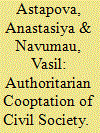

|
|
|
|
|
| Summary/Abstract |
In Belarus, a vibrant civil society coexisted for the better part of the past decade with a firmly entrenched autocracy in a depoliticised cooptation mode. Through cooptation, the energy of civil society was channelled from representing a threat to the regime into being its resource. However, the capacity developed by civil society during this period of political inactivity was quickly redeployed for political purposes at the junction of economic crisis, the regime’s failure to deal with the Covid-19 pandemic and the 2020 presidential election. After the 2020 mass protests, in which civil society played a pivotal role, the regime’s attitude to civil society turned to suppression and hostility.
|
|
|
|
|
|
|
|
|
|
|
|
|
|
|
|
| 3 |
ID:
065239
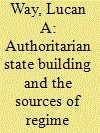

|
|
|
| 4 |
ID:
098021
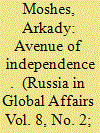

|
|
|
| 5 |
ID:
016547
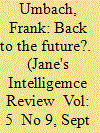

|
|
|
|
|
| Publication |
Sept 1993.
|
| Description |
410-414
|
|
|
|
|
|
|
|
|
|
|
|
|
|
|
|
| 6 |
ID:
176999
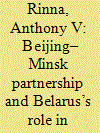

|
|
|
|
|
| Summary/Abstract |
China’s deepening ties with the Republic of Belarus, combined with the latter’s geographic position between the EU and Russia (the veritable leader of the Eurasian Economic Union), stands to potentially benefit China’s bid to deepen economic cooperation with the European Union. More specifically, enhanced collaboration between Beijing and Minsk helps the PRC develop relations with the Eurasian Economic Union (essential to China’s ambitions to augment cooperation with Europe) while simultaneously providing a geographic avenue for China into the central and eastern European regions of the EU for the Belt and Road Initiative (BRI). Nevertheless, the degree to which Beijing’s stronger relations with Minsk will serve Chinese interests in connecting with Europe will depend in large on whether or not Belarus and the EU can overcome significant differences in their relationship, as well as whether the relationship between the European Union and the Eurasian Economic Union (as a partner of the BRI) takes on a cooperative or a competitive nature.
|
|
|
|
|
|
|
|
|
|
|
|
|
|
|
|
| 7 |
ID:
186751
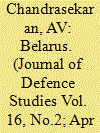

|
|
|
|
|
| Summary/Abstract |
Belarus has managed to escape the scanner of major countries reserved for rogue nations despite blatant violations of the laid-down international rules. Alexander Lukashenko, the President of Belarus, despite his moral credentials badly shaken after trumped up elections in 2020 still seems to be holding firm ground due to the unstinted support offered by Russia, an acknowledged military powerhouse. Despite committing grave acts of provocation endangering security of many nations, Belarus seems to have its way due to the strategic advantage it offers Russia in its dealing with NATO nations and Ukraine, an old friend turned new enemy on date. Further, Belarus has turned out to be an echo chamber of the Russian establishment and follows the predicted pathway paved by the Russians and is greatly assisting the aspirations of Putin who hopes to regain the lost glory of the erstwhile USSR.
|
|
|
|
|
|
|
|
|
|
|
|
|
|
|
|
| 8 |
ID:
120670
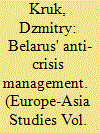

|
|
|
|
|
| Publication |
2013.
|
| Summary/Abstract |
The response of Belarus to the global economic crisis was shaped by a number of distinctive features of the Belarusian economy and of the economic policies implemented before the crisis. The specifics of anti-crisis management in Belarus resulted in a distribution of output losses for a number of subsequent periods and delayed recession. The scenario of stabilisation policies in Belarus can therefore be regarded as ineffective. The core reasons for this are an inappropriate choice of policy instruments and delayed exit from stabilisation policy. It is argued that this policy mix has long-term implications, including worsening economic growth prospects.
|
|
|
|
|
|
|
|
|
|
|
|
|
|
|
|
| 9 |
ID:
180754
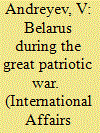

|
|
|
| 10 |
ID:
139280
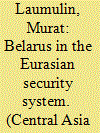

|
|
|
|
|
| Summary/Abstract |
The Republic of Belarus occupies the western periphery of geopolitical Eurasia, by which I mean the post-Soviet space, and is fairly far removed from Central Asia. This distance, however, does not mean that Belarus is safely protected from the security threats emanating from the Central Asian region, and, on the whole, Inner Eurasia. The Belarusian expert community is not indifferent to these problems. Belarus has preserved its military and strategic importance for Russia within the categories of European confrontation of the previous period. Today, it is consistently and actively involved in military integration within the CSTO. The armed forces of Russia and Belarus are tied together by the so-called coalition approach. Civilian and military experts of the Republic of Belarus are studying the hypothetical possibility of its involvement, at the technical level, in the Collective Rapid Reaction Force of the CSTO if and when NATO pullout of Afghanistan sends waves of instability across Central Asia.
|
|
|
|
|
|
|
|
|
|
|
|
|
|
|
|
| 11 |
ID:
010095
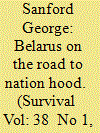

|
|
|
|
|
| Publication |
Spring 1996.
|
| Description |
131-153
|
|
|
|
|
|
|
|
|
|
|
|
|
|
|
|
| 12 |
ID:
188302


|
|
|
|
|
| Summary/Abstract |
Following the 2014 Ukraine crisis, Belarus and Kazakhstan appear caught in an alliance security dilemma characterised by intra-alliance threat and entrapment, as both are potential targets of militarised hybrid warfare by their vastly more powerful ally, Russia. Despite having sought foreign policy flexibility between the two increasingly opposed geopolitical camps of the West and Russia, Minsk and Nur-Sultan appear drawn further towards Moscow. Utilising their pre- and post-2014 national security documents, reinforced by an examination of their rhetoric and policies, this essay demonstrates how both countries reassessed their security environment in the wake of the annexation of Crimea and the initial war in the Donbas region.
|
|
|
|
|
|
|
|
|
|
|
|
|
|
|
|
| 13 |
ID:
187256
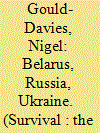

|
|
|
|
|
| Summary/Abstract |
Belarus’s recent arc offers three wider lessons for winding down the present international crisis over the Russia–Ukraine war and for planning the post-war order. Firstly, highly personalistic rule is prone to error. The flagrancy of Belarusian leader Alyaksandr Lukashenka’s electoral rigging ignited popular indignation, and the extreme brutality of the ensuing crackdown fanned popular outrage. Secondly, and paradoxically, autocracy is strong. Lukashenka’s tight control over all institutions of the state enabled him to prevent elites from defecting or losing the will to resist. Thirdly, ambiguities and compromises are unstable, and must sooner or later give way to clarifying choices. The post-war order must embed decisive outcomes, not unsustainable compromises. The West’s challenge is to enmesh a stable Ukraine in a wider peace that, for the third time in a century, builds a durable security order in Europe.
|
|
|
|
|
|
|
|
|
|
|
|
|
|
|
|
| 14 |
ID:
169615
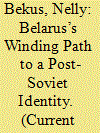

|
|
|
|
|
| Summary/Abstract |
“Some of the state’s recent initiatives have sought to reappropriate ethno-cultural and pre-Soviet history and tradition, shaping a new politics of identity.”
|
|
|
|
|
|
|
|
|
|
|
|
|
|
|
|
| 15 |
ID:
092910
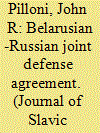

|
|
|
|
|
| Publication |
2009.
|
| Summary/Abstract |
Belarus and Russia have been discussing and actually working on the integration of their defense structures since Former President of Russia Boris Yeltsin and President of Belarus Aleksandr Lukashenko agreed to the formation of the greater Belarus-Russia Union State. Although development of the overall union state has been slow, some might argue stultified, the two countries have made progress in integrating their defenses. There are only a few colleagues with much interest in Belarusian defense matters, except within the context of their military relationship with Russia. What interest there is concentrates on several recurring questions. How much progress has there actually been? In what areas has the progress occurred? Does the integration present any sort of danger to the West? What sort of capabilities does this force have? This paper attempts to answer them.
|
|
|
|
|
|
|
|
|
|
|
|
|
|
|
|
| 16 |
ID:
189394
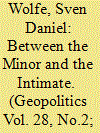

|
|
|
|
|
| Summary/Abstract |
Through an investigation of authoritarian encounters in Russia, Belarus, and Ukraine, this paper takes seriously the challenges of making geopolitical sense of contextualised micro moments. Working in a minor key, the paper offers three contributions. First, it advances a minor theory, micropolitical sensibility that interrogates the co-constitution of intimate and geopolitical scales. Second, it proposes a loose ethnographic framework to guide the analysis of ordinary moments, link them outside of the immediate, and make fuller sense of the geopolitical: rupture, digestion, connection, and representation. Third, it aspires to destabilise regional container thinking and Orientalising tendencies through a focus on authoritarian practices rather than authoritarian states. Overall, the paper foregrounds a minoritarian reading of the micro-dynamics of authoritarian encounter in order to enrich the conversation on the constitution of the geopolitical, while also offering an intimate and interconnected methodology that encourages critical, safe, and ethical research under authoritarian conditions.
|
|
|
|
|
|
|
|
|
|
|
|
|
|
|
|
| 17 |
ID:
174736
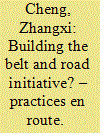

|
|
|
|
|
| Summary/Abstract |
This study attempts to understand the pragmatic development of the belt and road initiative (BRI) in light of the Chinese government’s stated claim that the BRI will be ‘using key economic industrial parks as cooperation platforms’. Through the examination of three overseas economic and trade cooperation zones in the context of the BRI, this study engages with current Chinese language work on the BRI to argue that whilst at the regional level some initiatives may be workable and able to deliver given certain circumstances, in consideration of the goal of continuous expansion of the BRI, both the Chinese government’s role and corporate awareness by Chinese investors is lacking and has undermined general policy goals.
|
|
|
|
|
|
|
|
|
|
|
|
|
|
|
|
| 18 |
ID:
174206
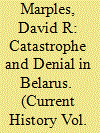

|
|
|
|
|
| Summary/Abstract |
The long-ruling president has manipulated World War II history and downplayed the lasting effects of the Chernobyl nuclear disaster. His similarly dismissive approach to the pandemic provided a spark for an unprecedented election challenge and popular resistance.
|
|
|
|
|
|
|
|
|
|
|
|
|
|
|
|
| 19 |
ID:
106438
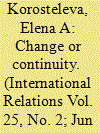

|
|
|
|
|
| Publication |
2011.
|
| Summary/Abstract |
This article examines the discourse of the EU's relations with eastern Europe under the recently launched Eastern Partnership (EaP) initiative. First, it evaluates the EaP's conceptual framework to suggest that there seems to be more continuity than change in the EU's modus operandi with its neighbours. More crucially, the notion of 'partnership', central to the new philosophy of cooperation with the outsiders, continues to be ill defined, causing a number of problems for the effective and legitimate realisation of the European Neighbourhood Policy/Eastern Partnership in the region. Second, drawing on the empirical investigations of the official discourses in Belarus, Ukraine and Moldova, the article reveals an increasing gap between EU rhetoric and east European expectations. In the absence of adequate partnership response to the needs and interests of 'the other', the policy is unlikely to find anticipated legitimation in the neighbourhood.
|
|
|
|
|
|
|
|
|
|
|
|
|
|
|
|
| 20 |
ID:
089891
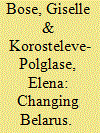

|
|
|
|
|
| Publication |
2009.
|
| Summary/Abstract |
Since the end of the Cold War, European Union (EU) efforts in transforming Central and Eastern Europe (CEE) have been enormously successful. The 2004 enlargement is widely regarded as the single most effective foreign policy strategy in the Union's history, and the recent European Neighbourhood Policy (ENP) was designed to repeat that success in countries located on the EU's new Eastern borders. Although the ENP has been the subject of substantive discussion in European academia, Belarus is the one country in Eastern Europe that has largely escaped scholarly attention.
|
|
|
|
|
|
|
|
|
|
|
|
|
|
|
|
|
|
|
|
|